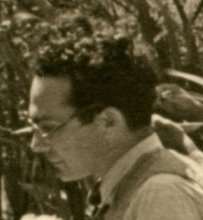© Família de António Aniceto Monteiro
Em 28 de Junho de 1966, através de um golpe de estado, o general Juan Carlos Onganía tinha deposto o presidente eleito da Argentina Arturo Umberto Illia. O texto de Eduardo L. Ortiz “The 1966 crisis” refere-se a este acontecimento.
*
The 1966 crisis
By the middle of 1966 a military coup deposed the elected President Dr. U. Illia. One month afterwards the buildings of several Faculties of Buenos Aires University, including that of Science, were assaulted by military personnel. Teachers and students suffered physical injury. A similar situation developed in Córdoba, Argentina’s oldest University, where a student was killed.
A large group of professors from both universities expressed clearly that they were not prepared to perform their duties under such abusive circumstances. Apparently the military leader had not ordered the action, but it became clear that he could neither prevent its repetition. Many hundreds of resignations were handed over in protest in Buenos Aires and in Córdoba. If this non-cooperation attitude may have seemed frivolous to some of those few academics (2) who preferred to remain, future events showed that it was both reasonable and timely to express dissatisfaction about a wave of violence that was then gathering momentum and was going to destroy so many Argentine lives in a very near future.
Bahía Blanca was not directly affected by this first crisis, and was to become, for some time, the main centre for Mathematical research in Argentina. It was, however, affected by another factor, lurking in the background at the time: the progressive deceleration of the impulse of the fifties and early sixties on scientific research, scientific development and education, reflected more and more in the reductions, in real terms, of financial support to these activities. Not clearly visible then, it gives us now a more accurate perception of the provocative attitude of the authorities, which forced many laboratories to close down completely.
By the middle of 1966 a military coup deposed the elected President Dr. U. Illia. One month afterwards the buildings of several Faculties of Buenos Aires University, including that of Science, were assaulted by military personnel. Teachers and students suffered physical injury. A similar situation developed in Córdoba, Argentina’s oldest University, where a student was killed.
A large group of professors from both universities expressed clearly that they were not prepared to perform their duties under such abusive circumstances. Apparently the military leader had not ordered the action, but it became clear that he could neither prevent its repetition. Many hundreds of resignations were handed over in protest in Buenos Aires and in Córdoba. If this non-cooperation attitude may have seemed frivolous to some of those few academics (2) who preferred to remain, future events showed that it was both reasonable and timely to express dissatisfaction about a wave of violence that was then gathering momentum and was going to destroy so many Argentine lives in a very near future.
Bahía Blanca was not directly affected by this first crisis, and was to become, for some time, the main centre for Mathematical research in Argentina. It was, however, affected by another factor, lurking in the background at the time: the progressive deceleration of the impulse of the fifties and early sixties on scientific research, scientific development and education, reflected more and more in the reductions, in real terms, of financial support to these activities. Not clearly visible then, it gives us now a more accurate perception of the provocative attitude of the authorities, which forced many laboratories to close down completely.
...
(2) In Evolución de las Ciencias en la República Argentina, 1923-1972, Sociedad Científica Argentina, Buenos Aires, 1975, Prof. J. F. Westerkamp, editor of vol. II, Física, says that as a result of the 1966 crisis the Physics Department lost 95 % of its teaching and research assistants and 15 out of 17 Professors. Several research laboratories had to be closed. The situation in the Mathematics Department, not so objectively reported in vol. I, Matemáticas, of the same series was not different.
[De] Eduardo L. Ortiz: Professor António Monteiro and contemporary mathematics in Argentina.
*
Ver:
La noche de los bastones largos (29 de julio de 1966, la policía por orden del presidente de facto Onganía decide ingresar por la fuerza a la Universidad de Buenos Aires, intervenirla y detener a alumnos y docentes.)
Historia del peronismo - Dictadura de Ongania (Juan Carlos Ongania, llamado popularmente "La Morsa", asume como presidente de facto de la autodenominada "Revolucion Argentina" el 29/06/66, habiendo derrocado al presidente constitucional Arturo Illia. Su gobierno se caracterizo por un marcado anticomunismo y medidas arbitrarias que afectaron derechos y garantias individuales con el fin de "aniquilar el pensamiento de izquierda comunista", como la intervencion de las universidades nacionales (La Noche de los bastones largos).Producido el levantamiento popular conocido como Cordobazo (29/05/69) es asesinado el dirigente sindical Augusto Timoteo Vandor, y el 29/05/70 es secuestrado y posteriormente ajusticiado por la organizacion revolucionaria armada Montoneros el ex presidente golpista, general Pedro Eugenio Aramburu, responsable de los fusilamientos de civiles y militares peronistas en 1956.Finalmente el 08/06/70 el general Ongania es destituido por una junta de comandantes, que nombra presidente a otro general, Roberto Marcelo Levingston.(Fragmento de "La Republica perdida")Lista de reproduccion videos de la Historia del Peronismo:http://www.youtube.com/view_play_list?p=FAB9EA9C4169EA86Por favor no solicitar el envio del archivo, para bajarlo a la PC ir a la pagina http://keepvid.com/ y pegar alli la direccion.)
Derrocamiento del presidente Illia (1966: El presidente de Argentina, Arturo Humberto Illia es derrocado por fuerzas militares. En su lugar, usurpa el poder el general Juan Carlos Onganía, quien pasaría a la historia como el responsable de la llamada Noche de los Bastones Largos.)
Historia Argentina (1955-1982) Las crisis militares (Fragmento de Historia Argentina de Felix Luna. La serie completa en la lista de reproduccion:





